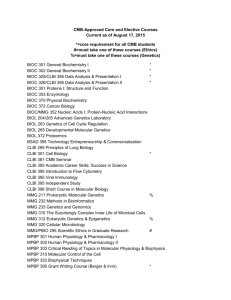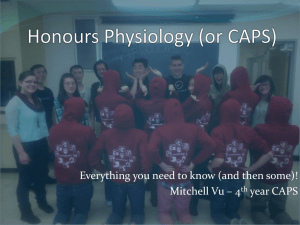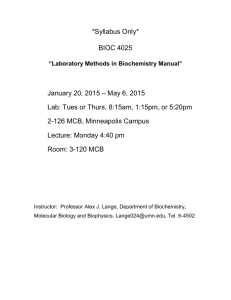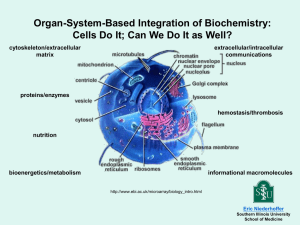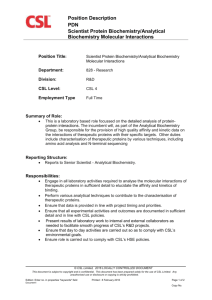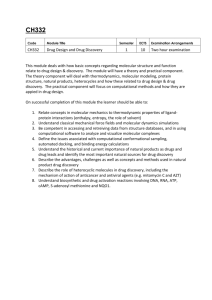Doctorate Program
advertisement
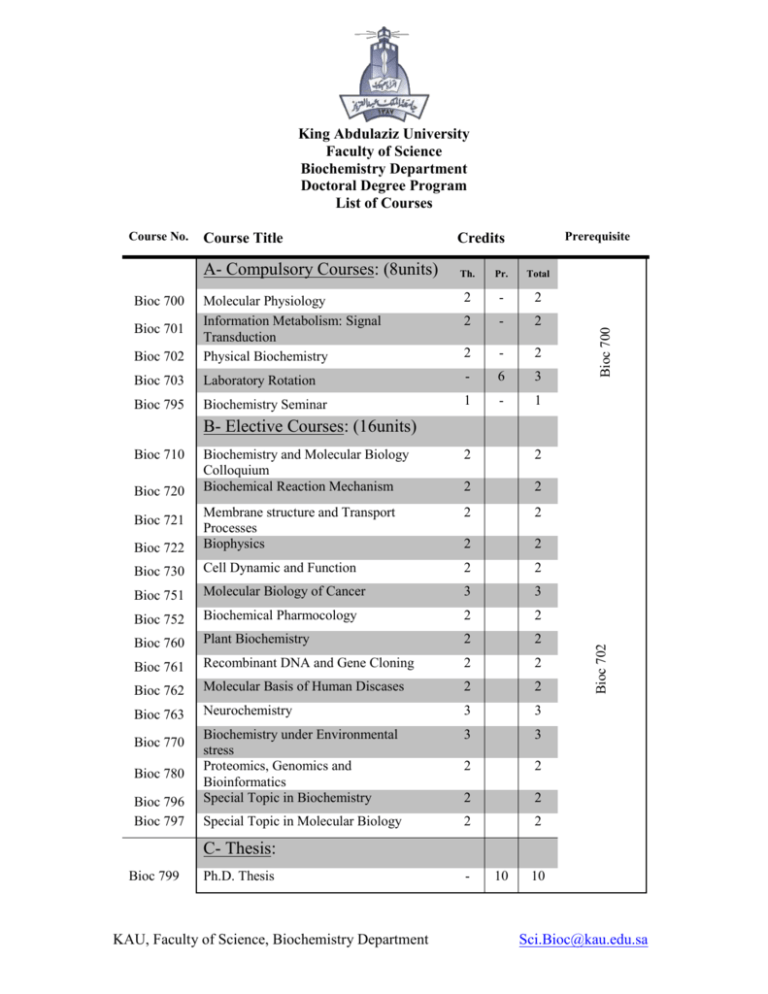
King Abdulaziz University Faculty of Science Biochemistry Department Doctoral Degree Program List of Courses Prerequisite Course Title Credits A- Compulsory Courses: (8units) Th. Pr. Total 2 - 2 2 - 2 Bioc 702 Molecular Physiology Information Metabolism: Signal Transduction Physical Biochemistry 2 - 2 Bioc 703 Laboratory Rotation - 6 3 Bioc 795 Biochemistry Seminar 1 - 1 Bioc 700 Bioc 701 Bioc 700 Course No. Bioc 710 Biochemistry and Molecular Biology Colloquium Biochemical Reaction Mechanism 2 2 2 2 2 2 Bioc 722 Membrane structure and Transport Processes Biophysics 2 2 Bioc 730 Cell Dynamic and Function 2 2 Bioc 751 Molecular Biology of Cancer 3 3 Bioc 752 Biochemical Pharmocology 2 2 Bioc 760 Plant Biochemistry 2 2 Bioc 761 Recombinant DNA and Gene Cloning 2 2 Bioc 762 Molecular Basis of Human Discases 2 2 Bioc 763 Neurochemistry 3 3 Biochemistry under Environmental stress Proteomics, Genomics and Bioinformatics Special Topic in Biochemistry 3 3 2 2 2 2 Special Topic in Molecular Biology 2 2 Bioc 720 Bioc 721 Bioc 770 Bioc 780 Bioc 796 Bioc 797 Bioc 702 B- Elective Courses: (16units) C- Thesis: Bioc 799 Ph.D. Thesis KAU, Faculty of Science, Biochemistry Department - 10 10 Sci.Bioc@kau.edu.sa Course No. Bioc 700 Bioc 701 Bioc 702 Bioc 703 Bioc 795 Bioc 710 Bioc 720 Bioc 721 Bioc 722 Bioc 730 Course Title A- Compulsory Courses: (10 units) This course aim to study the molecular basis of organs and tissues functions. The topics covered include: Multicellular organisms versus single cell organisms-cell differentiation-Tissues-Organs-Systems-Gastrointestinal physiology-Renal physiologyRespiratory physiology-Muscle contraction. This course centres on the communication or signal transduction (S.T.) between cells and tissues. The topics covered include phases of signal transduction (intercellular and intracellular signal transduction) – Ligand – Gated ion channel receptors – Enzyme – Linked receptors – Cytokine receptors – G - Protein – coupled receptors – Cyclic AMP and Cyclic GMP based signal transduction – Calciumbased signal transduction – Phospholipid- based signal transduction – Integration of signal transduction. The object of this course is the application of physical chemistry approaches to the study of biological problems. This course concerns the principles and application of classical and statistical thermodynamics, spectroscopy, kinetics and x-ray crystallography to the study of biomacromolecules and biochemical systems. The purposes of this course are two-fold (1) development of independency for the student to choose and carry out research, and (2) to operate different bioinstruments. This course include two, seven-week rotation per semester during the 1 st and 2nd semester of the first year. At the end of each rotation, student give short presentation on their projects to the other first year students, the instructor in charge and any other faculty and student who wish to attend. In addition each student prepare a short written report. Disscussion of current research in Biochemistry B- Elective Courses: (16units) The objective of this once-a-week course is to assist students in learning the techniques of and formal scientific presentation, and to foster the spirit of scientific exchange. This course include a series of colloquia offered by program faculty, students and occasional guest lectures, which covered the different field of interest to PhD students and recent advances in biochemistry research. The object of this course is the study the mechanism of biochemical Reactions. Topics covered include elementary reactions and mechanisms -Activation parometer (ΔG‡, ΔH‡, ΔS‡)- Rate of reaction and mechanisms- Methods of studying reaction mechanisms (radioisotopes, spectroscopy) - Types of reactions found in biological systems- General acid-base catalysis- Nucleophilic and electrophilic catalysis- Metal ion catalysis- protein transfere- Addition and elimination redox reaction- stereospecific of enzyme catalysed reaction- practical measurement of rates of fast reaction and analysis of kinetic data. The object of this course is the study the structure and function of biological membranes. Topics covered include: Molecular components of biological membranes- Interaction between membrane components – membrane mediated processes- membrane transportmembrane channels- membrane transporter- passive transport- active transportionophores The object of this course is the application of physics to study biological problems. The topics covered will include the chemical binding- Energies, Forces and bondsBiological energy (consumption, respiration and photosynthesis)- Thermal conductionExitable membranes- Nerve signals- Momery- Ionizing radiation. This course centres on the molecular basis of cell structure and functions. The topics covered will include cell properties (reproduction, molecular organization, dynamics and integration)- The components, assembly, metabolism and evolution of KAU, Faculty of Science, Biochemistry Department Sci.Bioc@kau.edu.sa Bioc 751 Bioc 752 Bioc 760 Bioc 761 Bioc 762 Bioc 763 Bioc 770 Bioc 780 Bioc 796 Bioc 797 Bioc 799 cellular structures-Interaction of cells with each other and with the environment. This course aims to study cancer at the molecular and cellular level. Topics include: cell out of control (cancers)- Transformed cells related to cancer cells- Environmental factors and the incidence of cancers- Genetically recessive multation in some tumers- oncogenes and tumor - Causing viruses- Retroviral- associated oncogenes. This course centers on the fundamentals of basic and clinical pharmacology. The topics covered include pharmacological and biochemical basis of drug absorption, distribution, biotransformation, toxicity and susceptibility- key principles of drug actioncellular resistance to antibacterial and anticancer drugs- Drug-drug interaction. The object of this course is the study of biochemistry unique to photosynthetic organisms. Topics covered include conversion of light energy to chemical energy by photosystems- charbon fixation- nitrogen fixation- cell walls- vacuoles- plant hormonesplant secondary metabolites and their ecological and medicinal roles. Cell and tissue cultures. This course centers on DNA structure, Manipulation and gene cloning and their applications. Topics covered include structure of DNA- Reproducing DNA-Gene expressionplasmids and phages- cutting and joining DNA Hyperidization, probes and amplification using PCR - cloning genes- using cloned genes- AIDS and gene delivery- cancer genes- Application of human genetics (Genetic testing, gene therapy and finger printing). This course is designed to study biochemical principles and concepts relevant to understanding the bases of specific human diseases. The topics covered will deal primary with defects in (1) signal transduction e.g. in cancer and diabetes (2) protein folding and turnover e.g. in lysosomal storage or agingrelated diseases and (3) metabolism, e.g. diseases of amino acid metabolism, bleeding disorders, and of the cardiovascular system. The object of this course is the study of the structure, function, organization and chemistry of the nervous system. Topics covered include: The central nervous system (CNS)- The peripheral nervous system (PNS)- function of the nervous system (sensory function, integrative functions, and motor functions)- organization of nervous system- Neurotransmission- Action potentialssynaptic transmission- neurotransmitter- nerve impulse processing and integrations. The object of this course is the study the biochemistry under different types of environmental stress. Topics covered include: enviromental stress (pollution, heat shock, low temperature, freezing, salinity and drought)- Biochemistry of microorganisms under low temperature, freezing- Biochemistry of plant under drought, salinity and heat shock- Biochemistry of human under the condition of heat chock, drinking salinity water and electromagnetic radiation. The object of this course is the application of computing concepts and mathematical modeling to study the biological information in the form of molecular sequences and structures. Topics covered include: Math primer (probability, combinatorial, optimization, entropy)- computational techniques for finding information in biological sequence, genome and molecular databases- structure prediction (RNA, DNA, proteins)- molecular structure and biochemical properties. Recent advances in selected areas of biochemistry will be presented. Lecture dealing with specialized topics or recent advances in the field of molecular biology will be presented. Ph.D. Thesis KAU, Faculty of Science, Biochemistry Department Sci.Bioc@kau.edu.sa
